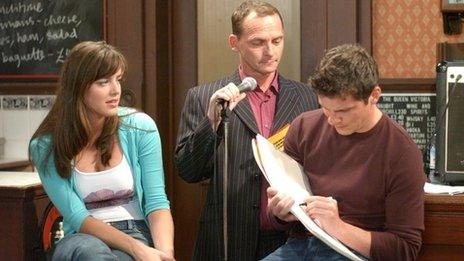British citizenship test 'like bad pub quiz'
- Published

Pub quizzes - good and bad - are a popular feature of modern British culture
The British citizenship test taken by 150,000 people every year has the intellectual rigour of a "bad pub quiz", a report suggests.
Thom Brooks of Durham University criticised the inclusion of "trivial" facts such as the age of Big Ben and the date on which the country's first curry house was established.
Most people in the UK would struggle with such questions, he added.
But the government said it had "stripped out mundane information".
The Life In The UK test must be passed to qualify for indefinite leave to remain in the country.
But Dr Brooks, a US immigrant who sat and passed the test in Newcastle upon Tyne in 2009, becoming a British citizen in 2011, said it was "unfit for purpose".
'Shocking'
He added: "The Life In The UK test has become a bad pub quiz. It has gone from testing practical trivia to the purely trivial and is a major opportunity lost.
"The biggest surprise is the lack of attention successive governments have paid to ensuring the test is fair and not out of date, a surprise even bigger than the sometimes shocking questions that can be found on the test."
Dr Brooks said: "Many citizens who were born and bred in the UK would struggle to know the answers to many of these questions.
"Britain will not be more cohesive because more have heard about the Battle of Trafalgar, but rather if future citizens understand better how to participate in daily British life and make a contribution."
The latest edition of the test, which took effect from 25 March, is based on the third edition of the handbook Life In The United Kingdom.
According to Dr Brooks, it includes: "Facts that are purely trivial and lack practical significance".
He cited the need to know the birth (1759) and death (1851) dates of Sake Dean Mahomet, credited with opening the UK's first curry house in 1810.
Participants were also required to know the name and nationality of his wife (Jane Daly, Irish) and the street where his restaurant was situated (George Street, London).
'Train timetables'
Lord Roberts of Llandudno, vice-chairman of the All-Party Parliamentary Group on Migration, external, said: "I am delighted to echo his call that the test, which is both impractical and irrelevant as it stands, be reformed.
"Surely future Britons should better understand how to participate in daily life, instead of knowing by rote which emperor invaded Britain in AD 43." The answer is Claudius.
The handbook contains about 3,000 facts including five telephone numbers, 34 websites, 278 historical dates and several brief excerpts of poetry.
A Home Office spokesman said: "We've stripped out mundane information about water meters, train timetables, and using the internet. The new test rightly focuses on values and principles at the heart of being British. Instead of telling people how to claim benefits, it encourages participation in British life."
He added: "This is just part of our work to help ensure migrants are ready and able to integrate into British society and forms part of our changes which have broken the automatic link between temporary and permanent migration.
"We have made radical changes to the immigration system and are determined to reduce net migration from the hundreds of thousands into the tens of thousands by the end of this parliament. The latest figures show these reforms are working, with net migration falling by more than a third since 2010."
- Published22 April 2013
- Published17 April 2013